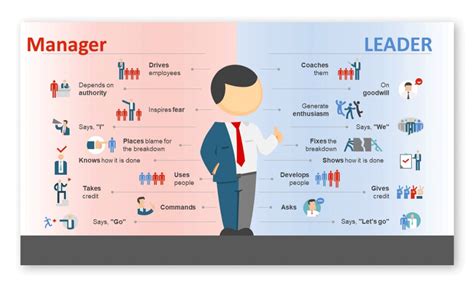Lead Vs. Manager: Understanding The Key Differences

When it comes to the workplace, the roles of a lead and a manager can often be confused or used interchangeably. However, understanding the key differences between the two is crucial for effective team management and overall success. In this article, we will explore the distinct characteristics and responsibilities of a lead and a manager, and showcase how they contribute to the growth and productivity of a team.
1. Definition
A lead is an individual who takes charge of a specific project or team, providing guidance, direction, and support to team members. They are responsible for overseeing the day-to-day operations, ensuring that tasks are completed on time and goals are achieved. On the other hand, a manager is a person who is in charge of a group of individuals or a department within an organization. They are responsible for planning, organizing, and controlling resources to achieve organizational goals.
2. Role and Responsibilities
2.1 Lead
A lead plays a crucial role in the success of a project or team. Their responsibilities include:
- Setting clear goals and objectives
- Assigning tasks and responsibilities
- Providing guidance and support
- Motivating and inspiring team members
- Monitoring progress and providing feedback
- Fostering collaboration and teamwork
- Identifying and resolving conflicts
- Ensuring timely completion of tasks
- Reporting to higher management
- Acting as a liaison between team members and higher management
2.2 Manager
A manager’s role is more focused on the overall functioning of a department or organization. Their responsibilities include:
- Developing and implementing strategies
- Allocating resources
- Setting performance targets
- Monitoring and evaluating performance
- Recruiting and selecting team members
- Training and developing employees
- Managing budgets and finances
- Ensuring compliance with policies and regulations
- Representing the department or organization
- Reporting to higher management
3. Skills and Qualities
3.1 Lead
To be an effective lead, one must possess the following skills and qualities:
- Communication: Leads need to effectively communicate goals, expectations, and feedback to team members.
- Leadership: Leads should have the ability to inspire and motivate team members towards a common goal.
- Problem-solving: Leads should be able to identify and address issues or obstacles that may hinder progress.
- Adaptability: Leads should be flexible and able to adjust to changing circumstances or project requirements.
- Collaboration: Leads should encourage collaboration and teamwork among team members.
3.2 Manager
Managers need to have a distinct set of skills and qualities to effectively carry out their responsibilities:
- Organizational skills: Managers should be able to plan, prioritize, and delegate tasks effectively.
- Decision-making: Managers should be able to make informed decisions in a timely manner.
- Strategic thinking: Managers should have a forward-thinking mindset and be able to develop long-term plans.
- Interpersonal skills: Managers should have strong communication and relationship-building skills.
- Financial acumen: Managers should have a basic understanding of budgeting and financial management.
4. Relationship with Team Members
The relationship between a lead and team members is often based on trust, collaboration, and mutual respect. Leads serve as mentors and guides, providing support and encouragement to team members. They work closely with team members to ensure that goals are met and obstacles are overcome.
Managers, on the other hand, have a more formal relationship with team members. They are responsible for evaluating performance, providing feedback, and making decisions that impact the team. While they may also provide guidance and support, their role is primarily focused on achieving organizational goals.
5. Conclusion
While leads and managers have distinct roles and responsibilities, both are essential for the success of a project or organization. Leads provide guidance and support to team members, ensuring that tasks are completed on time and goals are achieved. Managers, on the other hand, focus on the overall functioning of a department or organization, making strategic decisions and allocating resources. By understanding and embracing the differences between leads and managers, organizations can foster a productive and harmonious work environment.
6. FAQs
6.1 What is the main difference between a lead and a manager?
The main difference between a lead and a manager lies in their roles and responsibilities. A lead is responsible for overseeing a specific project or team, while a manager is in charge of a department or organization. Leads focus on day-to-day operations and goal achievement, while managers are more involved in strategic planning and resource allocation.
6.2 Can a lead become a manager?
Yes, a lead can eventually become a manager. As a lead gains experience and demonstrates leadership qualities, they may be promoted to a managerial position. However, it is important to note that not all leads have the desire or aptitude to become managers, as the roles require different skill sets and responsibilities.
6.3 What skills are important for both leads and managers?
Both leads and managers require strong communication, leadership, problem-solving, and collaboration skills. Additionally, managers need to possess organizational, decision-making, strategic thinking, and financial acumen skills. Interpersonal skills are also important for both roles, as they involve working closely with team members and higher management.
6.4 Can a manager also be a lead?
Yes, a manager can also act as a lead for a specific project or team within their department. In such cases, the manager takes on additional responsibilities related to the project or team, while still fulfilling their managerial duties. This allows for better coordination and alignment between the overall goals of the organization and the specific goals of the project or team.
